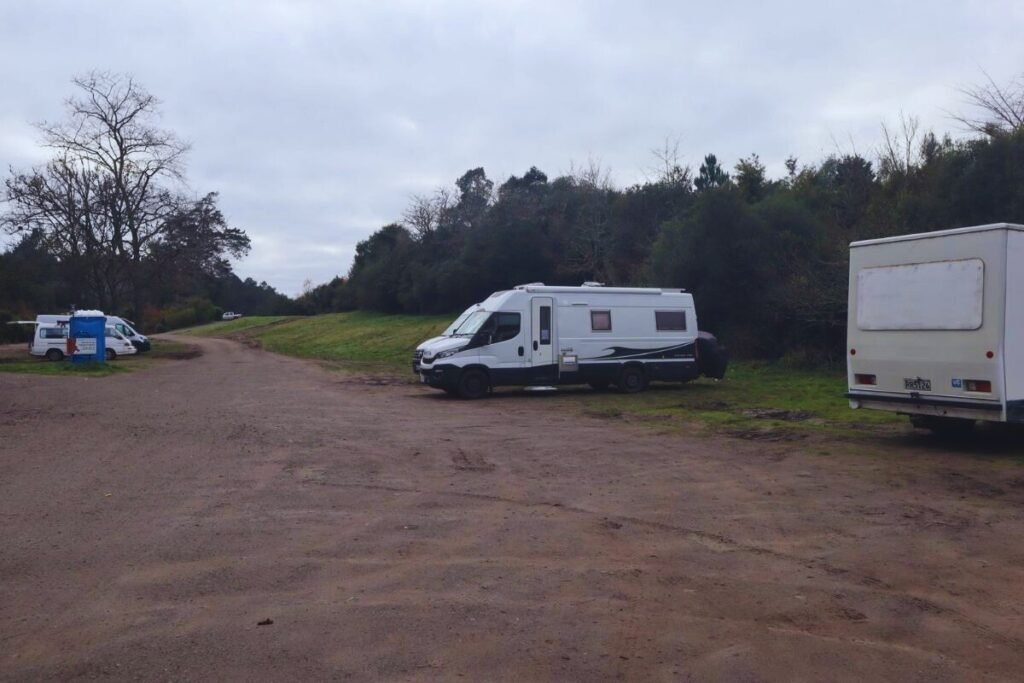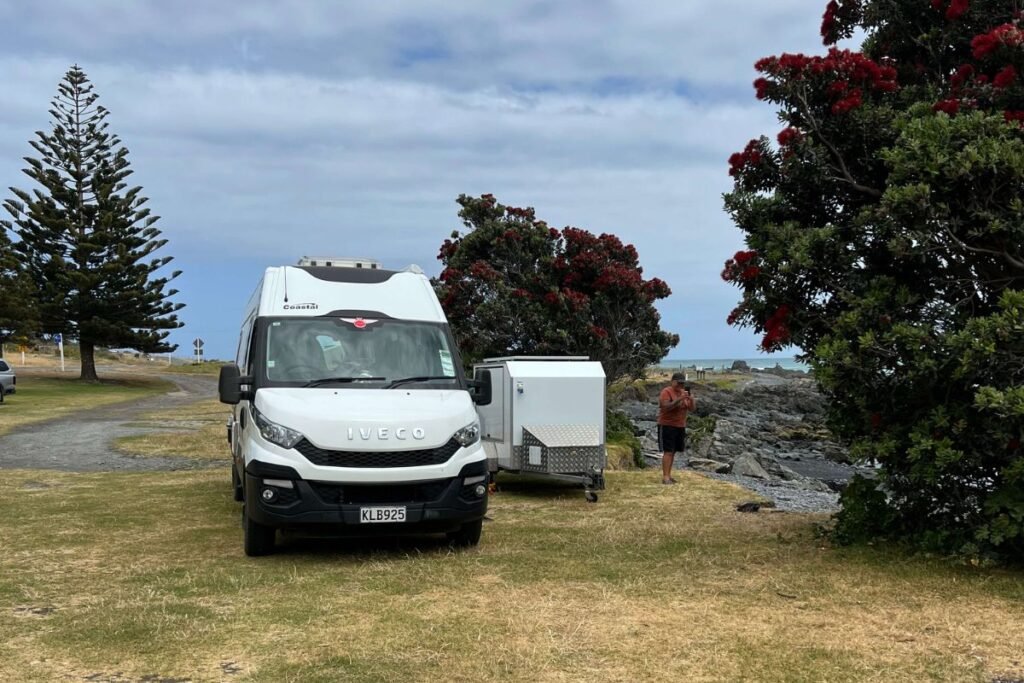Freedom camping is one of the best ways to truly connect with the land while travelling Aotearoa – New Zealand. Whether you’re parked beside a quiet lake, tucked into a remote forest, or watching sunrise on the beach, it’s an experience like no other.
But with this freedom comes responsibility. Understanding the rules, knowing where to stay, and respecting local communities and the environment are all part of doing it right. Here’s how to stay legal, comfortable, and safe while making the most of this unique Kiwi tradition.

Table of Contents
What is Freedom Camping?
Freedom camping means staying overnight in a public area that isn’t a traditional campground or holiday park. In Aotearoa, this is legal in many places but only if you’re in a certified self-contained vehicle.
This certification means your campervan must:
- Have a toilet that can be used inside the vehicle at all times
- Store greywater and wastewater
- Carry enough freshwater for three days
The goal is to let you camp without needing public toilets or dumping waste, helping to protect our wild places and keep them pristine.
What You’ll Need
To freedom camp legally and comfortably in Aotearoa – New Zealand, your setup needs to meet specific standards—thankfully, if you’re renting, this is all taken care of.
All campervans hired from major rental companies that promote freedom camping are required by law to be certified self-contained. This means the vehicle will come with:
- A functioning toilet that can be used inside the van at all times
- Greywater and blackwater storage tanks
- A fresh water supply (at least 12L per person)
- A blue self-containment sticker showing compliance with NZS 5465 standards
On top of that, you’ll want:
- A rubbish system—bring your own bin and bags, and always pack out your waste
- A respectful, low-impact attitude—freedom camping comes with responsibilities
➡️ Good to know: All reputable rental companies like JUCY, Spaceships, Britz, and Apollo supply self-contained vehicles fit for freedom camping. You won’t need to double-check certification unless you’re travelling in a privately owned camper or converting your own.

Where You Can (and Can’t) Camp
Knowing where you’re allowed to park up is one of the most important aspects of freedom camping in Aotearoa.
You can usually camp:
- On public conservation land managed by the Department of Conservation (DOC), unless signage says otherwise
- In designated areas approved by local councils—often marked with signs or noted in apps
You can’t camp:
- On private land without permission
- In urban centres, beaches, or scenic areas with “No Freedom Camping” signs
- In certain high-traffic areas like Queenstown, Rotorua, or Akaroa where freedom camping is heavily restricted
🚫 Fines of $200 are issued for illegal camping, and enforcement has increased in recent years—so it pays to double-check before settling in.
➡️ Helpful Tools: Use the CamperMate and Rankers NZ apps to find legal spots and read reviews from other travellers.
How to Find Sites
Gone are the days of guesswork. There are now excellent tools to help you find safe, legal, and scenic places to freedom camp.
- 🗺️ CamperMate App: The go-to app in NZ, with thousands of site listings, dump stations, reviews, and offline maps
- 🌿 Rankers NZ: Offers detailed filters, user-submitted photos, and up-to-date reviews
- 🏞️ DOC Website: Find DOC campsites with freedom camping allowances
- 💬 Local i-SITE Centres: Staffed by friendly locals, they’ll often have the best info on where you can stay in their area
➡️ Pro Tip: Always read the latest user reviews—conditions can change fast, especially after weather events or local council updates.
Staying Safe While Freedom Camping
While New Zealand is generally safe, it’s important to take precautions—especially in rural or unfamiliar areas.
- Avoid isolated locations if you’re travelling alone
- Park near other vans in less populated areas—it’s safer and more sociable
- Lock your vehicle and keep valuables out of sight
- Always check the weather, especially if camping near rivers or beaches
- Keep a portable charger or backup power bank for your phone
- Some urban spots may look scenic but attract night-time parties or unwanted attention—check reviews before staying
➡️ Trust your gut. If a spot doesn’t feel right, move on.
Freedom Camping Etiquette
This is the heart of freedom camping in Aotearoa—respect the land, locals, and fellow travellers.
- 🚮 Leave no trace: Pack out all rubbish, don’t bury toilet waste, and leave the site cleaner than you found it
- 💧 Use dump stations for greywater and blackwater—not bushes, ditches, or rivers
- ⛺ Be discreet: Don’t spread out chairs, awnings, or laundry like you’re in a paid campground
- 📍 Obey signs, and if approached by a ranger or local, be polite and follow directions
➡️ Good to Know: Many small towns welcome responsible campers and offer free or low-cost dump stations, water fills, and public toilets—support these communities when you can!
Final Thoughts
Freedom camping in Aotearoa – New Zealand is a privilege that offers unforgettable experiences, deep connection to nature, and a taste of real Kiwi road life. Done right, it’s low-impact, affordable, and soul-filling.
Respect the rules, plan ahead, and embrace the quiet freedom of waking up somewhere magical, for free.
➡️ Next in the Series: Best Apps for Campervan Travel in Aotearoa – New Zealand
🌍 Travel Planning Resources
These are the tools we personally use and trust when planning our travels from finding a place to stay to booking activities, transport and insurance. Let your Tohu guide you — Trust the Journey and follow what feels right for you.
- ✈️Flights – Compare great deals with Trip.com then Kiwi.com for flexible, affordable options.
- 🚐 Campervans – Compare rental deals with Motorhome Republic across Aotearoa and beyond.
- 🛏️ Stays – Compare hotels on Trip.com and TripAdvisor or Booking.com.
- 🚐 Rental Cars – Compare prices and book through Airport Rentals by Motorhome Republic for trusted brands and easy airport pickup.
- 🎟️ Activities – Browse tours and experiences on Viator, Get Your Guide, or TripAdvisor
- 🚆12Go Asia – Compare and book trains, buses, and ferries across Asia in one place with 12Go.
- 🛡️ Travel Insurance – Get flexible short-term coverage with Insubuy for your next holiday.
- 🔒 Protect Your Privacy with a VPN – We recommend Surfshark VPN for secure and private browsing while travelling. It’s fast, affordable and works worldwide — perfect for public Wi-Fi at airports, cafes and hotels.
- 📱 Travel eSIM – Stay connected with Airalo
- 💼 Lounge Access – Treat yourself with Priority Pass – for UK or US
- 🎶 Events & Concerts – Book tickets worldwide through Ticketmaster.
🧭 Note: Some booking links can be a bit shy when you’re using a VPN. If one doesn’t open, try pausing your VPN or switching to a different server location or secure Wi-Fi network to get things flowing again.
Haere ki tua o te paewai o te rangi
Go beyond what is known